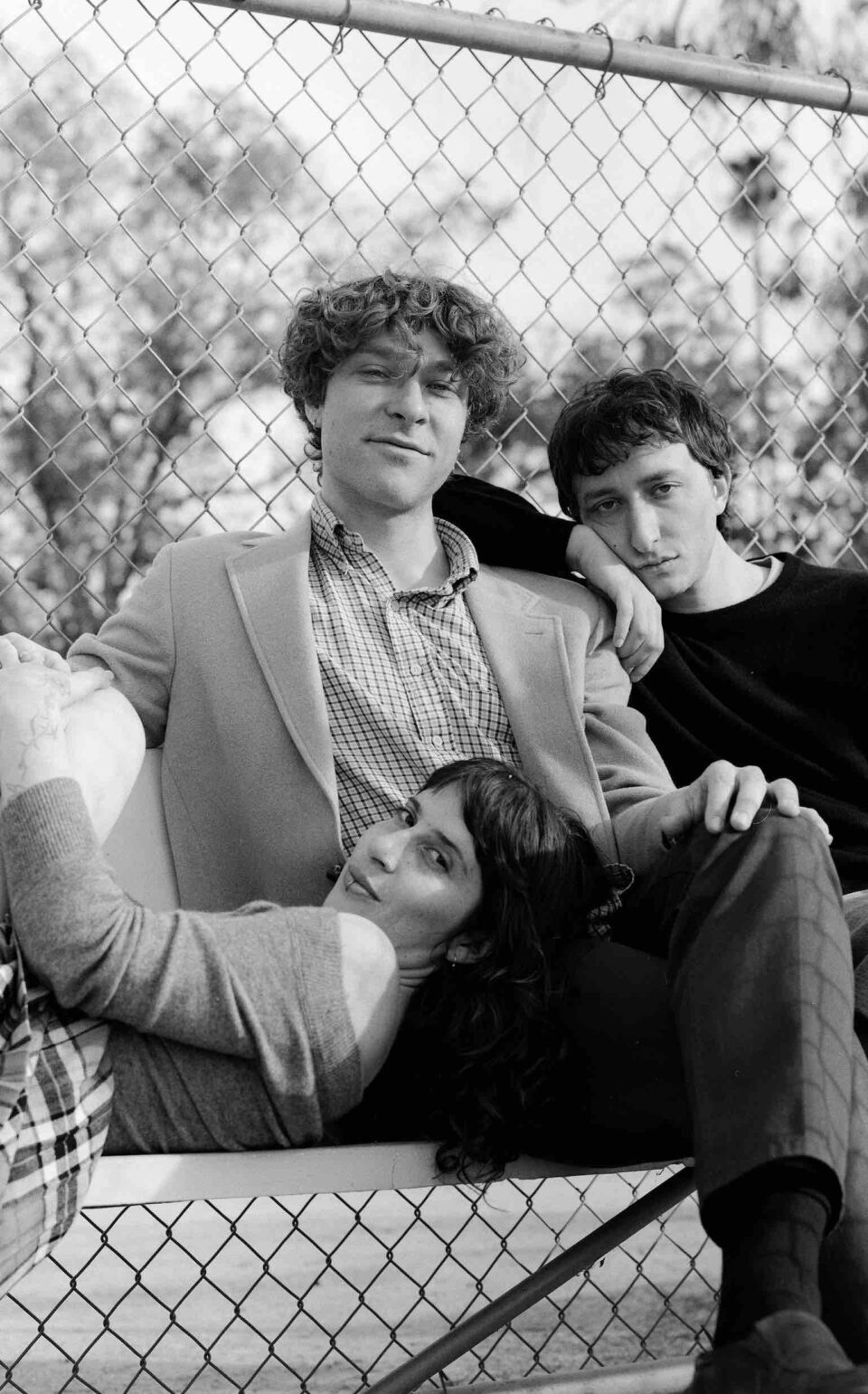“I remember it like the first time you get crushed by a wave when you’re little—it washes over you, almost like you didn’t know what you were getting into…huge, wet, and for a moment you aren’t sure if you’ll ever come back from it.” This is Cryogeyser band leader Shawn Marom’s recollection of their first time listening to Drop Nineteens from when we hit up a handful of current artists to discuss the impact of the newly returned shoegazers last year. It’s a poetic way of speaking that carries over to the lyrics Marom writes, as well as to their fawning asides about seeing some of their favorite artists—My Bloody Valentine, Duster, Nothing, Hotline TNT—in a live setting as we discuss their new self-titled album. It feels more like the way avid music fans talk about going to shows than the nonchalance of a figure deeply embedded within LA’s rock scene who’s friends with many of the artists they namedrop.
Perhaps this is because Cryogeyser, by Marom’s own definition—backed by a “weird” degree from The New School that’s anthropologically tied to genre—is less a “shoegaze” band than a “people-who-appreciate-shoegaze” band. As we discuss the often unacknowledged divisions between the original wave of the alt-rock subgenre in the ’90s, the recent revival among Millennials old enough to have unwittingly lived through that period, and the new crop of Gen-Z bands wildly experimenting with that familiar palette, it becomes clear that Marom’s emotional response to this type of music is matched by their technical understanding of its distinct throughline. “Every time I see Hotline TNT live I’m like, ‘Dude, this guy is using no pedals, this guy’s up there just walking near the amp at the right angle, at the right time,’” Marom exclaims. “And seeing MBV was like that—they’re using pedals, but watching the dance of it, watching the incoherence of shoegaze. That’s why I’m like, ‘I’m not shoegaze! I wish I was shoegaze, fully!’ There’s something so freeing about being engulfed in it, not being audible or recognized, being in your own secret world.”
While Cryogeyser’s music leans closer to dream-pop in its buzzing, airy atmosphere and mostly audible lyrical capsules of longing, their new LP still strives for that sense of immersion and euphoric escape. In being the product of the longest period between releases, Cryogeyser is both intentionally and inherently about the passage of time, as opposed to the in-the-moment records the band released prior, most recently 2021’s Timetetheredtogether (one word—as if, you know, tethered together). This gave Marom the space to philosophize about gradual, unperceived growth as a counter to the still-raw balladry heard—much more clearly—on their prior output. “I think in the beginning, my vocals were too loud,” Marom shares. “I always joke about how it’s funny that I’ve dated so many shoegaze men because they don’t care about lyrics at all. I’m writing all these songs about them when we break up, just like, ‘Can you hear me? Can you hear me?’ And he’s literally calling me like, ‘The melody in this song is so amazing!’ I’m like, ‘What? The melody?’ I’m literally saying, like, ‘Come back to me, my heart’s broken in half, la la la la la!’”
The mix on Cryogeyser, on the other hand, is less vocal-forward—a decision inspired by the more immersive sounds of Cocteau Twins and This Mortal Coil, and one abetted by producer Zach CapittiFenton (who’s also the band’s drummer), mixer Sonny Dipperi, and masterer Warren Defever of His Name Is Alive. “I can understand Cocteau Twins because I take the time to read the lyrics,” Marom reasons. “When you know what someone’s saying, you can hear it no matter what.” They note that this decision, among other creative choices, only came about from achieving “emotional distance” from the lyrical content of these songs, permitting them to more level-headedly focus on questions like, “‘How do I play music? How do I want the guitar to sound? How do I want the production to be?’ I think what that means is that it’s less about the moment and more about the process.”
“I’m like, ‘I’m not shoegaze! I wish I was shoegaze, fully!’ There’s something so freeing about being engulfed in it, not being audible or recognized, being in your own secret world.”
Marom explains that they approached the recording of this album in the same way a caterpillar undergoes transformation (“Do they know they’re changing? Do they know that they’re out of commission for that long and then come out as something else?”), aiming to surprise listeners as much as they surprise themself. In doing so, Cryogeyser seemingly evolves naturally from two opening tracks that feel like fully formed versions of the sound the band chased on their prior material, into a pupal stage experimenting with grunge guitar and some cleaner 2000s-era pop sounds, and ends with an unexpected homage to Frou Frou, Massive Attack, Ivy, Seal, and “Bittersweet Symphony” all at once. “[‘Love Language’] is my pride and joy,” Marom tells me about the closer. “I feel like I don’t ever make a song where I write down, like, seven bands I want to sound like, but I gave myself permission on that one, and to have Zach produce the shit out of that so it sounds like sitting in the back of my mom’s car in elementary school when the only CDs she had were Enya and The Verve Pipe.”
Though our chat inevitably always folds back into shoegaze, it’s a broader sense of nostalgia that seems to be at fault. The wider scope of influences cited on that closing track suggests that maybe it’s more the wistful element that Cryogeyser has always sapped from shoegaze rather than any dense wash of sound. Cryogeyser’s exploration of two extremes gradually achieved over a certain span of time seems doubly appropriate when you remember its creator’s fascination with the way musical genres exist on these same spectrums. “I was making this music when it wasn’t cool,” Marom reminds me with a laugh, addressing the quarter century between the mid-’90s and 2020 when shoegaze had largely fallen out of fashion. “In LA [in 2018] as a 23-year-old, it was the cool subculture thing, not necessarily the popular thing. But now it is!”
“I was making this music when it wasn’t cool. In LA in 2018 as a 23-year-old, it was the cool subculture thing, not necessarily the popular thing. But now it is!”

Stuck between two different generations when the kind of music they’re most attracted to was being backed by major labels, Marom can only hope that Cryogeyser gets lumped in with one or the other, now or later. “I want both things for myself—I wanna be where the people are,” they muse, placing their bid to open for the next big shoegaze reunion tour á la Drop Nineteens. “Like, if Cocteau Twins comes back and I don’t get to do that, I’m gonna freak out—like, ‘Come on guys, that one’s mine.’
“But I also wanna keep making music, so that future-me can go on this future legacy tour,” they continue, tethering together a loop in our conversation, a loop in the history of shoegaze, and a loop in their own trajectory as an artist all at once as they envision a future where up-and-coming bands contribute quotes to a written appreciation for an under-the-radar shoegaze band during a second dark age for the genre. “Maybe people are gonna really love this album and I’m gonna be able to live all my wildest dreams. Or maybe I’m gonna have the real shoegaze story where in 15 to 20 years everyone’s gonna be like, ‘I liked Cryogeyser,’ and I’m gonna be on a weird tour with, like, my baby on a bus.”
Either way, Millennials, Gen X, and Gen Z are all equally likely to get crushed by the wave that is Cryogeyser. “My little brothers think what I’m doing is cool,” Marom says with a sense of disbelief. “They never thought I was cool before. That rocks. Thank you, Gen Z, for giving me my little brothers’ approval.” FL







